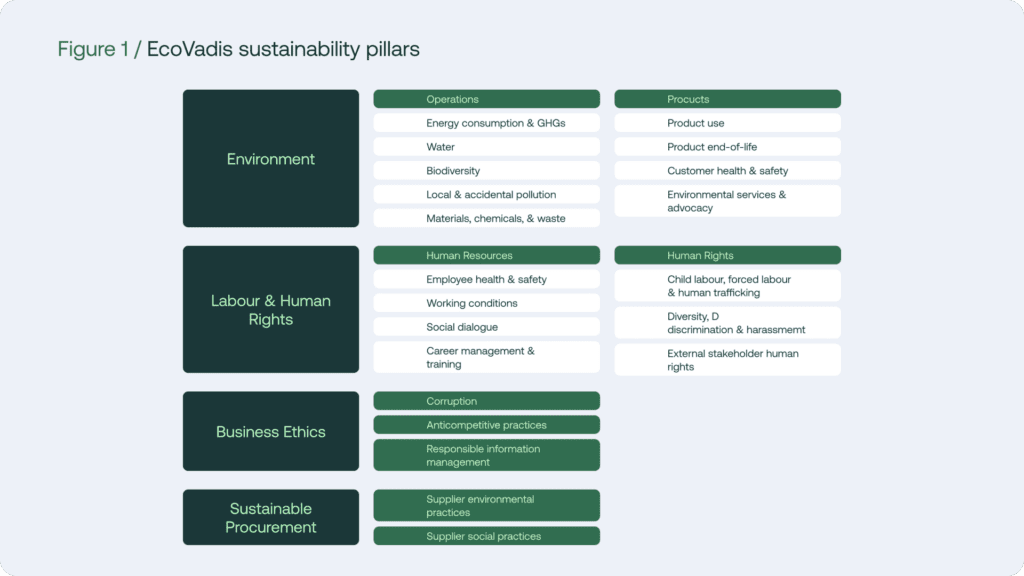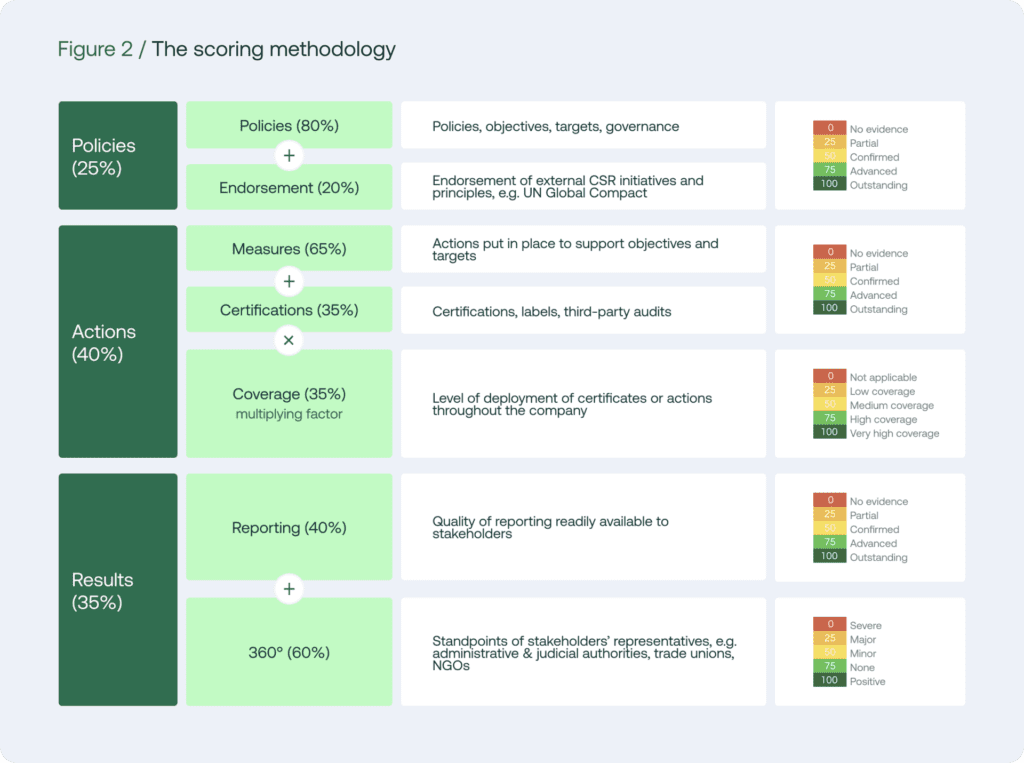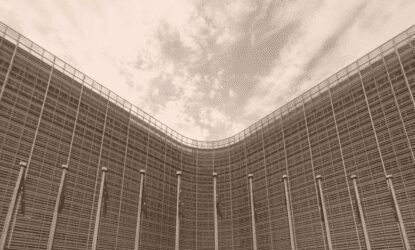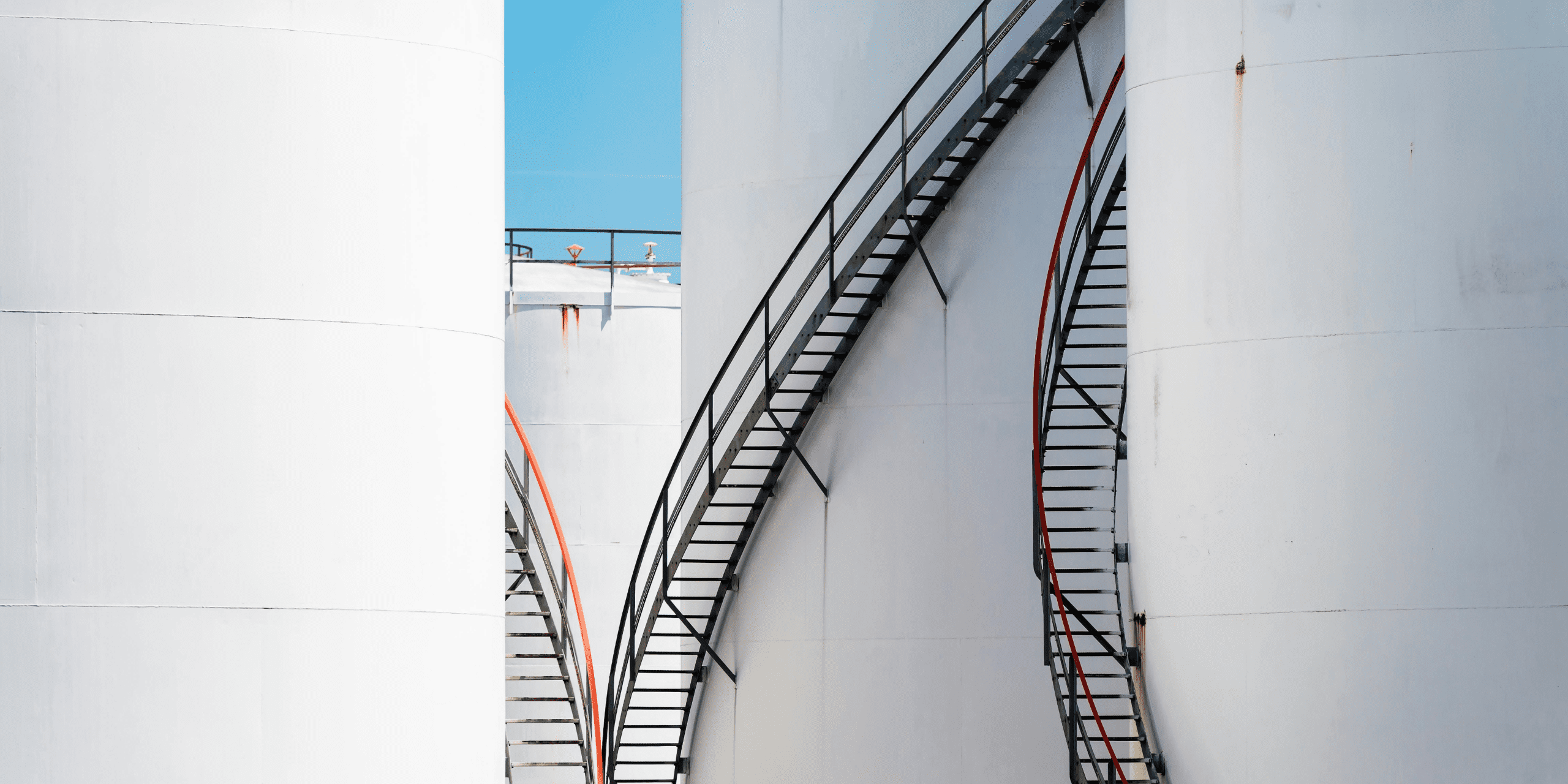 Why you should pay attention to the biodiversity crisis
Why you should pay attention to the biodiversity crisis
“The EcoVadis assessment could be the ideal sustainability catalyst for your organisation, driving transparency, collaboration and impactful climate action.”
Conducting thorough and regular assessments of your company’s approach to sustainability management has become increasingly necessary for modern businesses. And among the many assessment frameworks available to companies, EcoVadis is one of the most widely used, with over 130,000 organisations rated worldwide.
Founded in France in 2007, EcoVadis has quickly become an industry reference thanks to the comprehensiveness and rigour of its assessment approach. In fact, it’s fair to say that EcoVadis has been a key driver in the corporate sustainability movement, alongside other household names such as B Corp and the UN Global Compact (UNGC).
And as pressure grows on companies to provide more transparent disclosure on a range of environmental, social and governance issues, the importance of EcoVadis will continue to increase. In this blog, we discuss what you need to know about this key sustainability rating framework and the benefits it can bring your business.
Understanding the EcoVadis rating system
EcoVadis evaluates your company’s overall sustainability management system, including policies, processes and results achieved. In addition, group-level companies will be assessed on the extent to which measures are implemented across the group.
The assessment is structured around four key themes: Environment, Labour and Human Rights, Ethics and Sustainable Procurement. Within these themes, there are a number of sub-themes or ‘activated criteria’ against which your organisation will be measured. Similarly to ‘material topics’ in other reporting frameworks, criteria are ‘activated’ depending on the industry in which you operate and the specifics of your company.

Possible activated criteria include energy use and GHG emissions, biodiversity, water use, product end-of-life management and working conditions. For example, for a company that manufactures children’s toys, product end-of-life would be one of the activated criteria in its assessment. However, for a service-based company providing IT support, product end-of-life wouldn’t be so relevant. This targeted assessment approach ensures that only the meaningful impacts are taken into consideration.[1]
Get to know the EcoVadis scoring methodology
For each of your organisation’s activated criteria, three main ‘management layers’ are considered in the assessment: Policies, Actions, and Results.
Within these layers, there are seven ‘management indicators’: Policies, Endorsements, Measures, Certifications, Coverage (deployment of actions), Reporting and 360º Watch findings. This ensures comprehensive coverage of your company’s sustainability management system.

How does EcoVadis assess your company?
for each of the activated criteria. This may include policy and procedure documents, records of third-party audits, annual reports and KPI dashboards. The EcoVadis experts then analyse whether the submitted documents constitute sufficient evidence and to what extent they demonstrate the strength of your sustainability management system. Following the document analysis process, you’ll receive a score for each management indicator, which contributes to your overall score in each sub-theme.
It’s important to ensure that all documents submitted meet the EcoVadis document standards, i.e. they should be official, relevant and up to date. Also, bear in mind that external sources can contribute to your score in each sub-theme through the EcoVadis ‘360º Watch Findings’.[2] EcoVadis monitors a number of sources to gain a broader picture of your company’s sustainability management performance. These can include reports by non-governmental organisations (NGOs), trade unions, local and national government bodies, and other third-party organisations, as well as media reports and court cases.
EcoVadis then combines the sub-theme scores to produce a score for each of the four main themes. Each theme is weighted according to its importance to your company – based on your size, activities, location and industry – to produce an overall score out of 100. For example, the Environment theme would have a higher weighting for a logistics company than for an IT consultancy due to the different nature of their businesses.
What do my EcoVadis results mean?
Following the scoring process, your EcoVadis Scorecard will be made available to you and, if applicable, to the company that asked you to participate in the assessment. The Scorecard provides a detailed breakdown of the areas in which your company performed well, as well as areas for improvement.
Your organisation’s final score out of 100 is a weighted average of the theme scores. This determines whether your company is awarded an EcoVadis badge or medal – with levels ranging from Bronze to Platinum.
One of the benefits of the EcoVadis badge and medal system is that it compares your company’s performance against that of all assessed companies. For example, the top 1% of all rated companies will receive an EcoVadis Platinum Medal, while the top 5% will receive a Gold Medal, and so on.
This comparative approach makes it easier to give customers and value chain partners a clear idea of your company’s sustainability management performance compared to other players across a wide range of industries.
Note: some companies are not eligible to receive an EcoVadis badge or medal, including those in the tobacco, arms, and coal and lignite mining sectors.
Of course, the EcoVadis assessment isn’t just about demonstrating your company’s performance to stakeholders. It can also be a valuable strategic tool to help you identify the steps needed to improve your sustainability management system.
The EcoVadis Scorecard gives you detailed insight into your organisation’s areas for improvement, providing in-depth feedback on different themes and management areas. This expert analysis can help you prioritise which areas to focus on to make your improvement roadmap even more effective.
Meanwhile, the Corrective Action Plan feature simplifies the process of driving sustainable progress together with your value chain partners.
What is the EcoVadis carbon scorecard?
Since GHG emission reduction strategies are such an important element of corporate sustainability, EcoVadis has developed a dedicated Carbon Rating assessment.[3] This provides a comprehensive assessment of a company’s approach to carbon footprint reduction, as well as a dashboard to help you measure progress. You may be requested to complete the Carbon Rating assessment by a value chain partner such as a customer or a supplier – making it a key tool for driving more transparent value chain cooperation.
What are the long-term benefits of the EcoVadis assessment?
One of the best-known benefits of the EcoVadis assessment is being able to easily share your score with value chain stakeholders. Indeed, many companies choose to undertake the EcoVadis assessment to improve stakeholder engagement, providing a transparent overview of your organisation’s sustainability management system. This means obtaining a positive EcoVadis rating can improve your chances of becoming a preferred supplier.
The assessment also has multiple benefits when it comes to regulatory compliance. This is primarily because the EcoVadis methodology is based on the internationally recognised ISO 26000 standard, and because it has a strong focus on supply chain impacts. The assessment can, therefore, form a valuable basis for your reporting efforts according to a variety of frameworks, such as the GRI Standards[4] and the CSRD.
Want to find out more about the EU Corporate Sustainability Reporting Directive (CSRD)? Check out our recent blog CSRD 2024 update.
The EcoVadis assessment requires a broad focus and a comprehensive approach to sustainability reporting – and this means that many of the procedures you put in place during the process can facilitate future reporting. For example, many of the documents you’ll need to collect for your EcoVadis assessment will also be useful for compliance with other standards. And if you’ve already set up a cross-functional EcoVadis working group, you can expand this into a CSRD or GRI working group to streamline reporting.
This idea of a ‘positive feedback loop’ is supported by EcoVadis research. A recent study found that companies in its network that were rated ‘advanced’ or ‘outstanding’ are much more likely to report ‘in accordance with’ the GRI Standards.[5] Given the similarities between the CSRD and the GRI Standards,[6] there may also be benefits from a CSRD perspective. And even if your company doesn’t currently fall within the scope of the CSRD, the EcoVadis process can help you to improve collaboration with partners who do.
This is because the CSRD reporting guidelines typically require reporting companies to disclose information from relevant value chain partners such as customers and suppliers. This may include information on issues such as sourcing practices and labour and human rights policies. Therefore, if your company is a supplier to a larger company that’s required to publish a CSRD-compliant report, they may ask you to provide key information – for example, on how you source a particular raw material. If you’ve already taken steps to obtain this information as part of the EcoVadis assessment process, it will be much easier to then share this information with your value chain partners.
And that’s not to mention the many strategic benefits of the EcoVadis assessment for your company’s sustainability management. So, with consumers, regulators and value chain partners increasingly demanding transparent disclosures on social, environmental and ethical topics, the EcoVadis assessment could be the ideal sustainability catalyst for your organisation, driving transparency, collaboration and impactful climate action.
Want to find out more about the EcoVadis assessment process? Check back soon on our Sustainability blog for more insights.
[1] EcoVadis ratings methodology overview and Principles (2023) EcoVadis. Available at: https://resources.ecovadis.com/ecovadis-solution-materials/ecovadis-ratings-methodology-overview-and-principles-2022-neutral (Accessed: 20 September 2024).
[2] Ecovadis Document Guide (2024) EcoVadis. Available at: https://resources.ecovadis.com/ecovadis-solution-materials/ecovadis-document-guide (Accessed: 20 September 2024).
[3] Scope 3 engagement solution for GHG Management (2024) EcoVadis. Available at: https://ecovadis.com/solutions/carbon/ (Accessed: 23 September 2024).
[4] Leveraging sustainability ratings to support GRI reporting (2020) EcoVadis. Available at: https://resources.ecovadis.com/whitepapers/leveraging-sustainability-ratings-support-gri-reporting (Accessed: 23 September 2024).
[5] A surprising number of companies are approaching CSRD reporting readiness, Data says (2024) Sustainable Procurement and Supply Chain Resources. Available at: https://resources.ecovadis.com/blog/a-surprising-number-of-companies-are-approaching-csrd-reporting-readiness-data-says (Accessed: 23 September 2024).
[6] Efrag and GRI launch interoperability index (2023) XBRL. Available at: https://www.xbrl.org/news/efrag-and-gri-launch-interoperability-index/ (Accessed: 23 September 2024).











